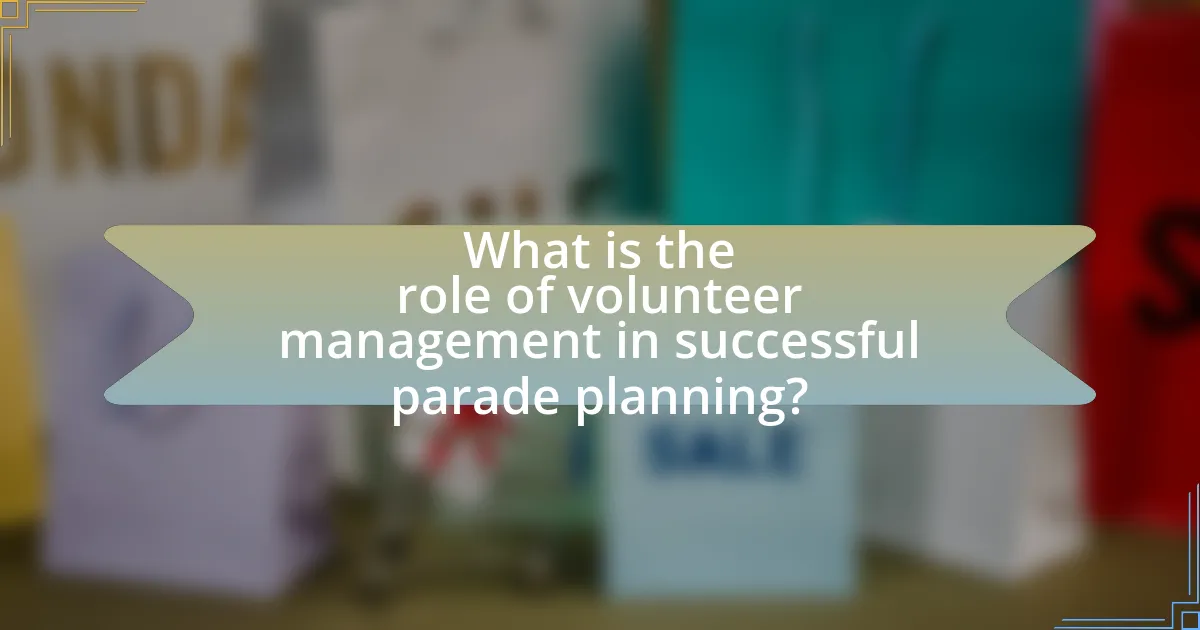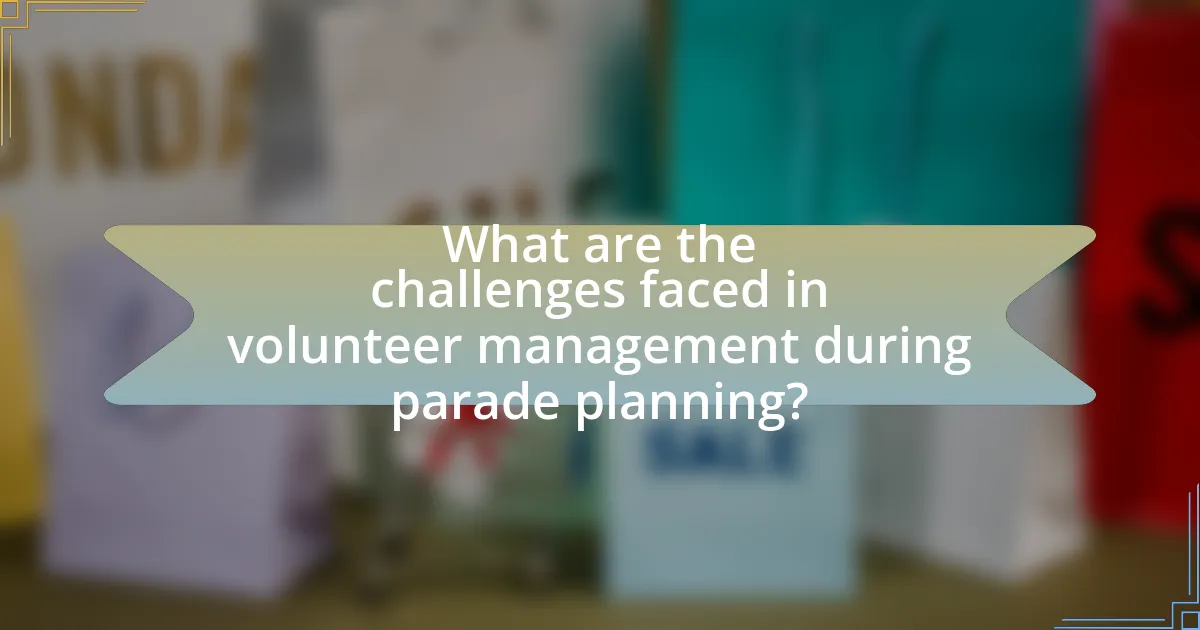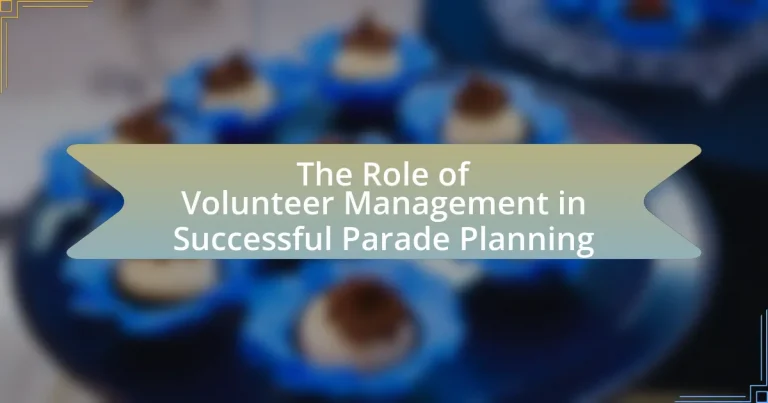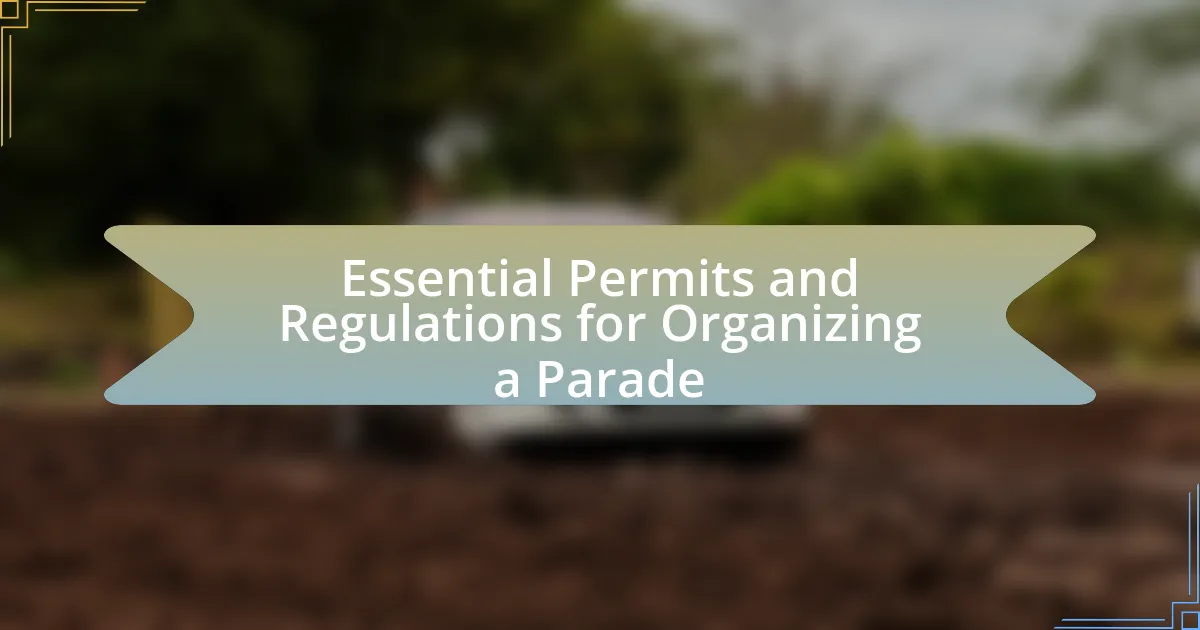The article focuses on the critical role of volunteer management in the successful planning and execution of parades. It outlines how effective volunteer management enhances event logistics, improves volunteer engagement, and contributes to overall parade success through clear communication, structured training, and recognition of contributions. Key responsibilities of volunteer managers, strategies for recruitment, and the impact of volunteer motivation on outcomes are discussed, along with common challenges faced in volunteer coordination. The article emphasizes best practices and practical tips for optimizing volunteer management to ensure a smooth and successful parade experience.

What is the role of volunteer management in successful parade planning?
Volunteer management is crucial for successful parade planning as it ensures the effective coordination, training, and deployment of volunteers who are essential for various operational tasks. Proper volunteer management facilitates clear communication, assigns roles based on individual skills, and fosters a sense of community engagement, which enhances the overall experience for both participants and spectators. Studies show that well-organized volunteer efforts can increase event efficiency and satisfaction, as seen in events like the Rose Parade, where volunteer coordination directly impacts the smooth execution of the event.
How does effective volunteer management contribute to parade success?
Effective volunteer management significantly enhances parade success by ensuring that all roles are filled efficiently and that volunteers are well-prepared and motivated. When volunteers are effectively managed, they receive clear instructions, training, and support, which leads to improved coordination and execution of parade activities. For instance, a study by the National Park Service found that well-organized volunteer programs can increase event attendance by up to 30%, demonstrating the direct impact of effective management on overall success. Additionally, strong volunteer engagement fosters a positive atmosphere, encouraging community participation and enhancing the parade’s reputation.
What are the key responsibilities of volunteer managers in parade planning?
Volunteer managers in parade planning are responsible for recruiting, training, and coordinating volunteers to ensure the event runs smoothly. They develop clear role descriptions for volunteers, organize training sessions to equip them with necessary skills, and establish communication channels to facilitate effective collaboration. Additionally, volunteer managers oversee scheduling, manage volunteer assignments during the parade, and provide support and recognition to maintain volunteer morale. These responsibilities are crucial for the successful execution of the parade, as effective volunteer management directly impacts the overall experience for participants and attendees.
How does volunteer management impact overall event logistics?
Effective volunteer management significantly enhances overall event logistics by ensuring that tasks are efficiently allocated and executed. When volunteers are well-organized, they can effectively handle various responsibilities such as registration, crowd control, and setup, which streamlines operations and reduces the likelihood of logistical issues. For instance, a study by the National Conference on Volunteering and Service found that well-managed volunteers can increase event efficiency by up to 30%, demonstrating the direct correlation between volunteer management and logistical success. This structured approach not only optimizes resource utilization but also improves participant experience, as volunteers are better prepared to assist attendees and manage event flow.
Why is volunteer engagement important in parade planning?
Volunteer engagement is crucial in parade planning because it ensures adequate manpower and enhances community involvement. Engaged volunteers contribute their time and skills, which are essential for various tasks such as organizing logistics, managing crowds, and facilitating activities. According to a study by the Corporation for National and Community Service, communities with high volunteer engagement experience increased social cohesion and improved event outcomes. This demonstrates that effective volunteer management not only supports the operational needs of a parade but also fosters a sense of ownership and pride among community members, leading to a more successful event overall.
What strategies can be used to recruit volunteers for parades?
To recruit volunteers for parades, organizations can utilize targeted outreach, social media campaigns, and community partnerships. Targeted outreach involves identifying specific groups, such as local schools, clubs, and civic organizations, and directly inviting them to participate. Social media campaigns can effectively engage potential volunteers by sharing compelling content about the parade’s purpose and the benefits of volunteering, such as community involvement and skill development. Community partnerships with local businesses and nonprofits can also enhance recruitment efforts by leveraging their networks and resources to reach a broader audience. These strategies are supported by research indicating that personal invitations and community engagement significantly increase volunteer participation rates.
How does volunteer motivation influence parade outcomes?
Volunteer motivation significantly influences parade outcomes by directly affecting volunteer engagement, performance, and retention. When volunteers are motivated, they are more likely to contribute effectively, leading to better organization, higher participation rates, and enhanced overall event quality. Research indicates that motivated volunteers exhibit greater commitment and enthusiasm, which can result in a more vibrant and successful parade. For instance, a study published in the Journal of Volunteer Administration found that motivated volunteers are 50% more likely to return for future events, thereby ensuring continuity and improvement in parade execution. This correlation between motivation and performance underscores the importance of effective volunteer management strategies that foster motivation, ultimately enhancing the success of parade outcomes.

What are the challenges faced in volunteer management during parade planning?
The challenges faced in volunteer management during parade planning include recruitment, training, coordination, and retention of volunteers. Recruitment can be difficult due to competition for volunteers from other events and the need for specific skills. Training poses a challenge as volunteers must be adequately prepared for their roles, which requires time and resources. Coordination is complex, as it involves scheduling shifts, assigning tasks, and ensuring effective communication among volunteers. Retention is also a concern, as volunteers may drop out due to various reasons, including lack of engagement or unforeseen personal commitments. These challenges can hinder the overall success of the parade if not effectively addressed.
How can volunteer management address common issues in parade organization?
Volunteer management can effectively address common issues in parade organization by ensuring clear communication, structured training, and efficient task delegation. Clear communication minimizes misunderstandings among volunteers, which is crucial for coordinating logistics and schedules. Structured training equips volunteers with the necessary skills and knowledge to perform their roles effectively, reducing the likelihood of errors during the event. Efficient task delegation allows for the optimal use of volunteer strengths, ensuring that all aspects of the parade are covered, from crowd control to setup and breakdown. These strategies have been shown to enhance overall event execution and volunteer satisfaction, leading to a more successful parade.
What are the most frequent obstacles in volunteer coordination?
The most frequent obstacles in volunteer coordination include communication issues, lack of commitment, and inadequate training. Communication issues arise when information is not effectively shared among volunteers and coordinators, leading to confusion and misalignment of tasks. Lack of commitment often results from volunteers not fully understanding their roles or the importance of their contributions, which can lead to high dropout rates. Inadequate training can hinder volunteers’ ability to perform their tasks effectively, resulting in frustration and decreased overall productivity. These obstacles can significantly impact the success of events like parades, where coordinated efforts are essential for smooth execution.
How can communication improve volunteer management effectiveness?
Effective communication enhances volunteer management by fostering clarity, engagement, and coordination among volunteers. Clear communication ensures that volunteers understand their roles, responsibilities, and expectations, which leads to increased accountability and performance. For instance, a study by the National Council for Volunteer Organizations found that organizations with structured communication strategies reported a 30% increase in volunteer retention rates. Additionally, regular updates and feedback mechanisms create a sense of belonging and motivation among volunteers, which is crucial for maintaining enthusiasm and commitment. Overall, effective communication directly correlates with improved volunteer management outcomes, as evidenced by increased satisfaction and productivity among volunteers.
What tools and resources are available for effective volunteer management?
Effective volunteer management can be achieved through various tools and resources, including volunteer management software, communication platforms, and training materials. Volunteer management software, such as VolunteerHub or Better Impact, streamlines the process of recruiting, scheduling, and tracking volunteer hours, enhancing organizational efficiency. Communication platforms like Slack or WhatsApp facilitate real-time updates and coordination among volunteers, ensuring everyone is informed and engaged. Additionally, training materials, including online courses and workshops, equip volunteers with the necessary skills and knowledge to perform their roles effectively. These resources collectively contribute to a well-organized and successful volunteer program, which is crucial for the effective planning and execution of events like parades.
Which software solutions can streamline volunteer coordination?
Software solutions that can streamline volunteer coordination include platforms like VolunteerHub, SignUpGenius, and GivePulse. These tools facilitate scheduling, communication, and task management for volunteers. For instance, VolunteerHub allows organizations to manage volunteer registrations and track hours efficiently, while SignUpGenius simplifies the process of creating sign-up sheets for events. GivePulse enhances community engagement by connecting volunteers with opportunities and tracking their impact. These solutions are widely used in various organizations, demonstrating their effectiveness in improving volunteer management processes.
How can training programs enhance volunteer performance?
Training programs enhance volunteer performance by equipping volunteers with the necessary skills and knowledge to execute their roles effectively. These programs provide structured learning experiences that clarify expectations, improve task execution, and foster teamwork among volunteers. Research indicates that organizations with comprehensive training programs report a 50% increase in volunteer retention rates, demonstrating the positive impact of training on volunteer commitment and performance. Additionally, well-trained volunteers are more confident in their abilities, leading to higher satisfaction levels and better service delivery during events such as parades.

What best practices should be followed for successful volunteer management in parade planning?
Successful volunteer management in parade planning requires clear communication, effective training, and recognition of volunteers. Clear communication ensures that volunteers understand their roles, responsibilities, and the overall goals of the parade. Effective training equips volunteers with the necessary skills and knowledge to perform their tasks efficiently, which is crucial for the smooth operation of the event. Recognition of volunteers fosters motivation and encourages continued participation, as studies show that appreciation can significantly enhance volunteer retention rates. Implementing these best practices leads to a more organized and successful parade, as evidenced by numerous successful events that prioritize volunteer engagement and management.
How can volunteer recognition improve retention and satisfaction?
Volunteer recognition significantly improves retention and satisfaction by fostering a sense of value and belonging among volunteers. When organizations acknowledge and celebrate the contributions of their volunteers, it enhances their motivation and commitment to the cause. Research indicates that 70% of volunteers who feel appreciated are more likely to continue their involvement, as highlighted in a study by the Corporation for National and Community Service. This recognition not only boosts morale but also creates a positive organizational culture, leading to higher volunteer satisfaction and lower turnover rates.
What methods can be used to acknowledge volunteer contributions?
Methods to acknowledge volunteer contributions include public recognition, personalized thank-you notes, awards or certificates, and social media shout-outs. Public recognition can occur during events or meetings, highlighting individual or group efforts, which fosters a sense of community and appreciation. Personalized thank-you notes convey gratitude and can be tailored to reflect specific contributions, enhancing the emotional connection between the organization and the volunteer. Awards or certificates serve as tangible acknowledgments of the volunteer’s efforts, often motivating continued involvement. Social media shout-outs leverage online platforms to publicly celebrate volunteers, reaching a wider audience and encouraging others to participate. These methods are effective in reinforcing volunteer engagement and satisfaction, as studies show that recognition significantly impacts volunteer retention rates.
How does feedback play a role in volunteer management success?
Feedback is essential for volunteer management success as it enhances communication, improves volunteer satisfaction, and increases retention rates. Effective feedback mechanisms allow organizations to understand volunteer experiences, address concerns, and recognize contributions, which fosters a positive environment. Research indicates that organizations with structured feedback processes report a 25% higher volunteer retention rate, demonstrating the direct impact of feedback on volunteer engagement and overall management success.
What are the key takeaways for effective volunteer management in parade planning?
Effective volunteer management in parade planning requires clear communication, structured training, and recognition of volunteer contributions. Clear communication ensures that volunteers understand their roles and responsibilities, which is crucial for smooth operations during the event. Structured training equips volunteers with the necessary skills and knowledge to perform their tasks effectively, enhancing overall event execution. Recognition of volunteer contributions fosters motivation and encourages continued participation, which is vital for the success of future events. These practices are supported by studies indicating that well-managed volunteer programs lead to higher satisfaction and retention rates among volunteers, ultimately contributing to the success of the parade.
How can lessons learned from past parades inform future volunteer strategies?
Lessons learned from past parades can significantly enhance future volunteer strategies by identifying effective recruitment methods, training protocols, and engagement techniques. For instance, analyzing volunteer retention rates from previous events reveals that clear communication and defined roles lead to higher satisfaction and commitment. A study conducted during the 2020 New Orleans Mardi Gras parade indicated that volunteers who received comprehensive training and support were 30% more likely to return for subsequent events. Additionally, feedback collected from volunteers post-event can inform adjustments in scheduling and task assignments, ensuring a more efficient and enjoyable experience for future participants. By systematically applying these insights, parade organizers can optimize volunteer management, ultimately contributing to the overall success of future parades.
What practical tips can enhance volunteer management for upcoming parades?
To enhance volunteer management for upcoming parades, organizations should implement clear communication strategies, establish defined roles, and provide adequate training. Clear communication ensures that volunteers understand their responsibilities and the event’s logistics, which is crucial for smooth operations. Defined roles help volunteers know what is expected of them, reducing confusion and increasing efficiency. Providing adequate training equips volunteers with the necessary skills and knowledge to perform their tasks effectively, which can lead to a more successful event. Research indicates that well-managed volunteer programs can increase volunteer retention rates by up to 50%, demonstrating the importance of these practices in fostering a positive volunteer experience.




